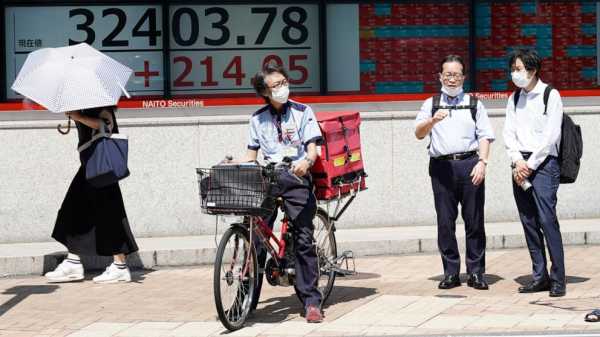
BEIJING — Global stock markets rose Tuesday ahead of a U.S. inflation update traders hope will show the need for more interest rate hikes is easing.
Paris, Shanghai, Frankfurt and Tokyo advanced. Wall Street futures were little-changed. Oil prices rose.
Wall Street's benchmark S&P 500 index gained 0.2% on Monday following its second weekly decline in two months.
Traders looked ahead to Wednesday's update on U.S. consumer prices for signs of whether the Federal Reserve might decide inflation has cooled enough following a year of interest rate hikes. They hope the U.S. central bank will decide no more are needed, though Fed officials suggest as many as two more increases are possible this year.
Forecasters expect inflation in June to fall to 3.1% from the previous month's 4%. That would be higher than the Fed's 2% target but down sharply from last year's peak above 9%.
“They will have a hard time justifying further rate increases if headline inflation — which is their mandate — is moving convincingly towards target,” said Rubeela Farooqi of High Frequency Economics in a report.
In early trading, the CAC 40 in Paris rose 0.5% to 7,178.65. The DAX in Frankfurt added less than 0.1% to 15,683.25 while the FTSE 100 in London declined 0.3% to 7,264.22.
On Wall Street, the S&P 500 future was unchanged. That for that Dow Jones Industrial Average lost less than 0.1%. On Monday, the Dow Jones Industrial Average climbed 0.6%. The Nasdaq composite added 0.2%.
Tuesday in Asia, the Shanghai Composite Index gained 0.6% to 3,221.36 and the Nikkei 225 in Tokyo added less than 0.1% to 32,203.57. The Hang Seng in Hong Kong advanced 1% to 18,659.93.
The Kospi in Seoul surged 1.7% to 2,562.49 and Sydney's S&P-ASX 200 jumped 1.5% to 7,108.90.
India's Sensex was 0.6% higher at 65,719.45. New Zealand declined while Southeast Asian markets advanced.
Investors want to see whether the U.S. economy can avoid a recession after a run-up in the Fed's benchmark lending rate to cool inflation. They expected at least a brief recession starting this quarter but are more optimistic after U.S. hiring stayed strong.
On Wall Street, FMC, which sells herbicides, insecticides and other products to the agricultural industry, tumbled 11.1% on Monday for the biggest loss in the S&P 500 after it warned of a sudden drop in business around much of the world toward the end of May. It said the “unforeseen and unprecedented” declines would hurt its results for the spring and full year.
Investors are waiting for U.S. corporate profit reports for an update on how companies are being affected by inflation and weaker consumer spending.
Delta Air Lines and PepsiCo report Thursday. JPMorgan Chase will headline a rush of bank reports on Friday.
The wide expectation is for companies across the S&P 500 to report a 7.2% drop in earnings per share for the second quarter from a year earlier. That would be the biggest drop for the index since the spring of 2020, when the coronavirus pandemic was paralyzing the global economy.
In energy markets, benchmark U.S. crude rose 72 cents to $73.71 per barrel in electronic trading on the New York Mercantile Exchange. The contract fell 87 cents to $72.99 on Monday. Brent crude, the price basis for international oil trading, advanced 69 cents to $78.38 per barrel in London. It lost 78 cents the previous session to $77.69.
The dollar fell to 140.56 yen from Monday's 141.32 yen. The euro rose to $1.1007 from $1.0999.
Sourse: abcnews.go.com






